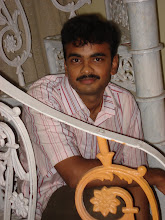Below is an interesting article in "The Speaking Tree" column of The Times of India, 04 Apr 2010.
Staying With The Question
Marguerite Theophil
While we are always encouraged to go in search of answers, we are not taught the higher-order skill of asking the right kind of questions.When solving problems, we are more likely to find relevant, wise answers if we learn first to ask “rich and juicy questions”. These, we learn, almost always start with ‘what' or ‘how' and are crafted around creating a desired outcome, rather than being framed as the kind of ‘why' questions that are mostly focused on examining what went wrong.
Accepting unquestioningly all that ‘consensus reality' offers us, we may live relatively safe lives, being fed our answers; never mind whether or not these answers are wholesome, just or humane. So, if the answers teach us that ‘the other' – anyone different in terms of religion, culture, community, gender, or whatever – is to be feared, suspected or even hated, we avoid questions like “Am i/ are we really that different?” and “When have i/we also thought or acted in a similar way?” and “How can i learn to see beyond my biases?”
These questions are scary to ask, because on the way to the answers, we might need to accept that our previous ‘givens' were not all they were made out to be, no matter where or whom they came from.
An interesting questioning process is ‘The Work' of Byron Katie, author of Loving What Is. This is a way to identify and question the thoughts that are the basis of our suffering. Part of this approach is a process of inquiry that includes ‘The Four Questions', that pull you progressively deeper into your unquestioned assumptions and really make you look closely at your habitual reactions: Is this true? Can you absolutely know that it's true? How do you react, what happens to you, when you believe that thought? And most interestingly – who would you be without the thought?
On another level, Sam Keen suggests that what shapes our lives are not just the questions we ask, but those we refuse to ask, or never think of asking. The questions we ask determine whether we will be superficial or profound, accepters of the status quo or seekers.
There are lower-order questions, and higher-order questions. Strangely, the lower-order ones give us answers more readily; but we really should be suspicious when our answers reveal how good, right or righteous, or wronged by others we are, and how wrong, misguided, cruel the other one is or other ones are. Typically, we ask: “Why me?”
Higher order questions often give us more churning, greater discomfort, or even a further lot of questions. But staying with them often gives us life-enhancing insights. Tough questions we grapple with include: What would i no longer be doing if my life were perfect in every respect? How do i become the unique self i am meant to be? How do i contribute to Life? What should i do to reduce the quantity of hate around? What will make me stronger? Which ‘rules' must i obey; which ones are healthy to disobey? What gives me true joy and peace? What are the first steps i must take to translate understanding into action?
To become a questioner is to make a commitment to search for wisdom rather than certainty. Many of these questions may not give us very clear-cut answers, but that is precisely the point; it's the act of asking them that works to shift one's consciousness.

